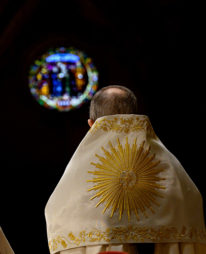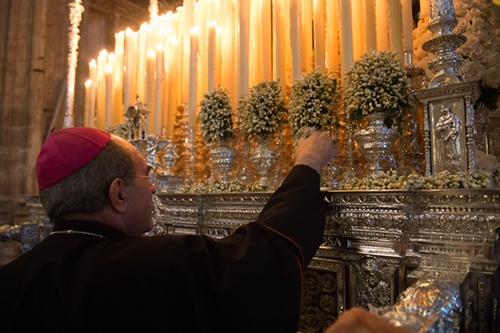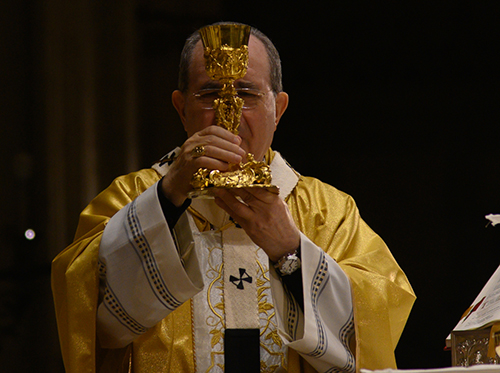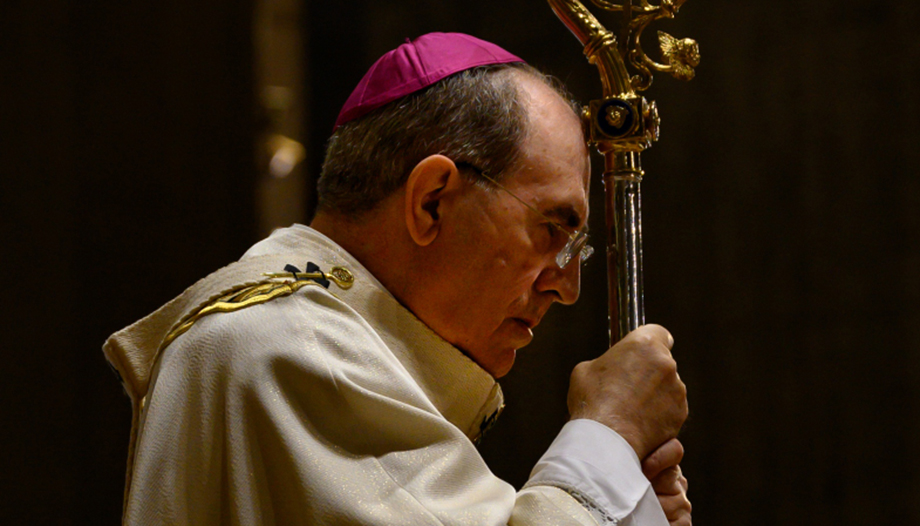He has pastored the See of St. Leandro for the past twelve years. José Ángel Saíz Meneses as the new Archbishop of Seville, Bishop Asenjo went "to the second line", as he himself defines it: "to pray, like the contemplatives, and to help the new Archbishop in whatever he wants".
Until Bishop Saiz Meneses takes office, Bishop Juan José Asenjo will remain at the head of the Archdiocese of Seville as Apostolic Administrator. Asenjo has served as Auxiliary Bishop of Toledo, Bishop of Cordoba and Archbishop of Seville.
Q- When you were Auxiliary Bishop of Toledo, you were elected Secretary General of the EEC in some very turbulent years, what do you remember of those years at the center of the Spanish Church?
Before becoming Secretary General, I had been Vice-Secretary for General Affairs of the EEC during the previous five years, from 1993 to 1997, when I was ordained Auxiliary of Toledo and I dedicated myself fully to the diocese until the following year. The vice-secretariat is the 'kitchen' where everything that comes out of the Episcopal Conference is worked on. Later, the bishops decided to elect me Secretary General.
They were years of hard work, at the service of the bishops of all Spain and all the organs of the Episcopal Conference: the plenary, the permanent... etc. At the same time, in Toledo I did what work I could, especially on weekends.
I remember some difficult years: the issue of ETA was very present in the life of Spanish society. Every now and then we woke up to a murder and not all the members of the Episcopal Conference saw things in the same way, which created many tensions and difficulties.
At the same time, these were exciting years, a time to get to know the Church in Spain in full light, dealing with all the bishops and dioceses.
To love Christ supposes loving his work, which is the Church, with its lights and shadows.
Msgr. Juan José Asenjo.Apostolic Administrator of Seville
P- You who know the Church in depth, who have been in various dioceses and dealt with so many others, how do you see the Church?
-In my years of service to the Church, I have been able to perceive the richness of the Church, both in Spain and in the universal Church, the Church that the Christian carries in his heart and loves with all his soul.

The Church is the prolongation of Christ in time, the prolongation of the Incarnation. To love Christ supposes loving his work, which is the Church, with its lights and shadows, its imperfections and sins. As St. Irenaeus of Lyons says, "the Church is the ladder of our ascent to God. We must love her with passion. I love her this way, I feel very proud to be a son and pastor of the Church.
Q- You were the coordinator of the V Apostolic Visit of the Holy Father John Paul II to Spain in May 2003. How did you deal with that responsibility?
-I received the task of organizing the papal visit at the end of November 2002. From that moment until May 2003 I literally lived for the Pope. I remember sleeping with a notebook on my bedside table in which I wrote down the things I remembered as I tried to sleep.
They were months of intense work, of infinite fatigue, certainly. At the same time I was able to serve closely a holy Pope, and for that I always thank God.
As national coordinator of the visit I had to get in touch with many people, asking for help. I was part of a commission with the participation of the Ministry of the Interior, the Community of Madrid, the Royal House, the Government, law enforcement agencies, etc., with whom there was always a good understanding. I also found good people who helped us financially, from small donations to large amounts. We wanted everything to go well and for the visit to bear spiritual fruit.
I remember the visit as a few days of grace: the Pope's arrival, the meeting at Cuatro Vientos and the familiar dialogue that was established between the Pope and the young people. The May 4 ceremony was truly a great feast of holiness, an eloquent invitation to be saints. The canonized were our contemporaries, which means that, also in this time, it is possible to be a saint.
I have an extraordinary memory: at the Nunciature I was able to eat at the Pope's table, very close to him. For me it was like being at the gates of heaven. On the steps of the plane, together with the King and Queen of Spain, St. John Paul II thanked me very much for the work I had done.
The Beatification Ceremony on May 4, 2003 was a great feast of holiness, an eloquent invitation to be saints.
Msgr. Juan José Asenjo.Apostolic Administrator of Seville
Three major dioceses: Toledo, Cordoba and Seville
Q- With your appointment to the see of Cordoba, your Andalusian career began, how would you define the diocese you arrived in 2003 and your pontificate in a diocese as solid as that one?
-Cordoba is a very well worked diocese. Bishop José Antonio Infantes Florido did a great job in not easy times. He lived at a time when there were 'too bold' experiences in many places. Don José Antonio had the courage to walk along autonomous paths without being carried away by the most "modern", for example, with respect to the seminary, which he took to Cordoba with excellent results. From that seminary San Pelagio have come out very valuable priests joined by very committed lay people, aware of what it means to be a Christian.
In Cordoba we worked magnificently in the area of the family, with dedicated delegates, such as Enrique and Concha; also in the field of popular piety and the Brotherhoods with Pedro Soldado or the renewal and professionalization of the communications team with the launching of the diocesan sheet... And, always, the care of the seminary and the priests, who continue to write and call me.
I remember Cordoba with great affection, I love the people of Cordoba and I know that they love me. It was a beautiful period. My idea was to retire and bury myself in Cordoba. Things turned out differently and I thank God for having fulfilled his will.
Q- You were planning to die in Cordoba, but in 2008, God changed your plans and you were named coadjutor archbishop with the right of succession..
-Indeed, I have been in Seville for 12 years. The beginnings were a bit more difficult; we could say, glassy. There were those who took it upon themselves to spread a kind of intoxicated, false rumor that I didn't love the Andalusians, that I didn't understand the world of the Brotherhoods and that I didn't come to Seville at ease. This is not true. I love the Andalusians very much, I came from Cordoba and I knew the world of the Brotherhoods very well. All that took some work to dismantle. I suffered, I do not deny it. The first two years were of much suffering.
The beginnings in Seville were not easy. There were those who spread the false rumor that I did not like coming here. Today I believe that, in general, the people of Seville love me. I love them.
Msgr. Juan José Asenjo.Apostolic Administrator of Seville.
With time people have seen that I was not an elusive person and that those rumors were untrue. In Seville I have spent my time in the diocese: I have gone to a hundred thousand places, I have preached, I have visited religious communities....
Today I believe that, in general, the people of Seville love me, as I love them, and they are happy that I will be living here when the new archbishop comes.
"Seville deserved a Faculty of Theology".
Q- Whenever you are asked about the work done at San Leandro, you always point out the Seminary, the family and, in the last few months, the San Isidoro School of Theology.…
-In Seville we have done a good job: we have a seminary with a solid formation, thanks to good formators and professors and a faculty of Theology San Isidoro that we have achieved in a short period of time. Seville deserved it. It fulfilled all the conditions, we had a stupendous, modern building, a library close to one hundred thousand copies, with an important old collection, we have professors and economic sufficiency.
Before the erection of the San Isidoro Faculty of Theology, there was no ecclesiastical faculty in the area of western Andalusia and Extremadura. I am very grateful to the Holy See for this faculty, which is being a very valuable instrument, together with the Higher Institute of Religious Sciences for the formation of lay people, priests, consecrated persons....
With the priests, too, a great work has been done. I love the priests very much, and they have seen that they are appreciated, even if I have had to correct them sometimes.
I am also very pleased with the work being done by the delegation of FamilyThe work is being done, for example, in the Family Guidance Centers. Another key issue is the field of charity, with an important involvement of Caritas in areas such as employment and care for the needy. One of the delegations that has gained special impetus in recent years is the diocesan delegation of Migrations which is working very well, helping many people to regularize their situation and is an important means of evangelization.
I am happy in Seville, I will stay in Seville to live after my relief, although I will spend the summer in Siguenza because of the heat.
The truth is that I have had three magnificent dioceses: Toledo, although my service was very rickety, was a strong diocese, with deep Christian roots. The "diocese of Don Marcelo", a great bishop. Cordoba, where I received the wonderful legacy of Don Jose Antonio and Don Javier Martinez. And finally, a great diocese like Seville.
They are dioceses in which one enjoys. All three are dioceses of deep Christian roots where there is a Christian humus that protects popular piety, the world of the Brotherhoods and Confraternities is a gift from God. The brotherhoods are like a big tent that prevents this Christian humus from drying up. Here secularization is less intense. The world of the Brotherhoods and Sisterhoods is a dike of containment of secularization.
The Brotherhoods are a dike of containment of secularism. To despise them is a complete mistake.
Juan José Asenjo Pelegrina.Apostolic Administrator of Seville
The importance of the Brotherhoods and Confraternities
Q- You mentioned the world of brotherhoods and fraternities which, throughout Spain, especially in areas such as Andalusia, but also in others, has a very great strength, how do you see this manifestation of faith?
In the immediate post-conciliar period, a certain part of the clergy looked with suspicion, and even contempt, at the Brotherhoods, as if they were a 'religious by-product', of inferior quality, not worth dedicating themselves to. I believe that this is a completely erroneous position. The Brotherhoods have enormous potential
A sensible, prudent bishop cannot stand in front of or with his back turned to the world of the Brotherhoods. He must love them, accompany them, so that they realize that the bishop loves them. To love and understand the brotherhoods is what confers authority to correct the things that need to be corrected.

In my episcopal work, I have visited all of them every Holy Week. This same year, without processional processions and with the physical limitations that I have, I have also visited them. Every day I have visited the brotherhoods that have made their penitential station. In each of them I was able to give a homily, we prayed a Salve and I gave them the Blessing. There were about eight or nine a day and, on Good Friday, twelve. I went to say goodbye to them and the Brotherhoods have been very appreciative. I appreciate it.
I am convinced that despising the brotherhood world is too arrogant and unintelligent. In Seville alone, half a million faithful are related to the world of the Brotherhoods. I will always tell my successor to love the Brotherhoods, to appreciate them, to know them and to dedicate time to them.
I will always tell my successor to love the Brotherhoods, to appreciate them, to know them and to dedicate time to them.
Juan José Asenjo Pelegrina. Apostolic Administrator of Seville
P- Since we are talking about Brotherhoods and considering the potential that you yourself have pointed out, would it not be logical to propose an Episcopal Commission for the Brotherhoods and Confraternities?
The Brotherhoods and Confraternities are, at present, under the umbrella of the Secular Apostolate. In the almost thirty years that I have been in the Spanish Episcopal Conference, the possibility of a commission of its own has been raised, at least, on a couple of occasions. There has been no consensus, perhaps because the Brotherhoods are between Liturgy and popular religiosity and Secular Apostolate.
I need prayer as I need to breathe or eat.
P- In the words of Pope Francis, "closeness to God is the source of the bishop's ministry". To speak of personal prayer is always a delicate subject, it is to look into the well of the unfathomable well of the soul, in this sense, how does Bishop Asenjo pray?
-When I lost the sight in my right eye last June, I was unable to pray the Breviary. For months I have been praying the four parts of the Rosary to compensate for not being able to pray the Breviary. About a month ago, Radio Maria gave me the audios and I discovered a new world with the audio books.
With the audios of the Psalms I am discovering the spiritual and literary richness of these prayers.
Msgr. Juan José Asenjo.Apostolic Administrator of Seville
St. Paul said that faith enters through the ear, '....fides ex auditu'.In my case, prayer is also 'ex auditu'. The truth is that I am enjoying the Psalms, the writings of the Holy Fathers, the Bible, thanks to these audios I am also discovering the literary richness of texts such as the Psalms, which are one of the most important works of history, not only in the spiritual but also in the aesthetic field.

Of course, I do my personal prayer times, in the morning and late afternoon, at length. I celebrate the Eucharist without haste. When I celebrate only the Holy Mass, I do it very slowly, enjoying the texts: the preparation for communion, the thanksgiving....
For me, the Eucharist and prayer are the most important moments of the day. They are the supernatural foundations on which the day is built. If I don't pray, something is missing. I need prayer, the peace of prayer, dialogue with the Lord as I need to breathe or eat. "We are what we pray"St. John Paul II said to the priests in Gift and mystery And so it is. What saves us, what constitutes us as Christians is prayer.
I make a prayer full of names. A pastor must bring to prayer the pains, sorrows and joys of his faithful.
Msgr. Juan José Asenjo.Apostolic Administrator of Seville
In summer, many times, I like to go out to pray in the countryside. I admire the wonders of nature, as the psalms say, I like to contemplate "the wonders of his hands".
At this time, above all, my prayer is one of thanksgiving: for all that he has done for me, since I was a child, by giving me a Christian family. For the example of my parents, good Christians who were generous with others. I also thank him for having been born in such a beautiful city as Sigüenza. I am convinced that my feeling with art, with heritage, has much to do with the city in which I was born, where, almost without realizing it, one enters into communion with beauty, materializes the Via Pulchritudinis and, through it, one arrives at the beauty of God.
My prayer is very simple. I pray a prayer full of names. A pastor has to bring to prayer the pains, sorrows and joys of his faithful: the suffering of the unemployed, the disconnection of young people..., I have a prayer full of names in a warm dialogue with the Lord.








